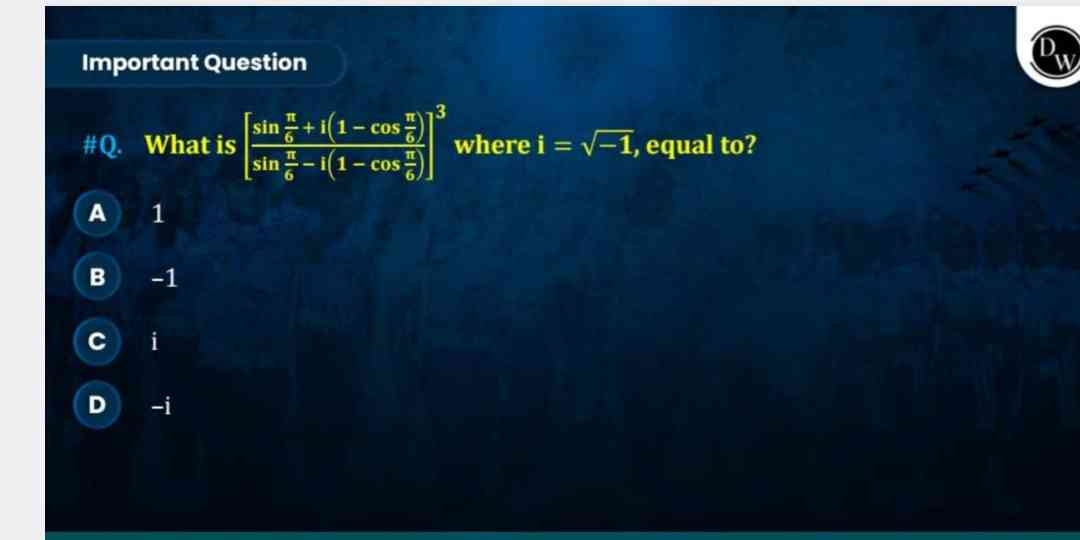What is [sin(π/6) + i(1 - cos(π/6)) / sin(π/6) - i(1 - cos(π/6))]^3 where i = √(-1), equal to?

Understand the Problem
The question is asking to evaluate a mathematical expression involving trigonometric functions and complex numbers. Specifically, it requires calculating the cube of a fraction where both the numerator and the denominator contain sinusoidal and cosinusoidal terms evaluated at π/6.
Answer
The final answer is $-i$.
Answer for screen readers
The answer is $-i$.
Steps to Solve
- Evaluate the trigonometric functions First, we need to evaluate $\sin\left(\frac{\pi}{6}\right)$ and $\cos\left(\frac{\pi}{6}\right)$.
Using known values: $$ \sin\left(\frac{\pi}{6}\right) = \frac{1}{2} $$ $$ \cos\left(\frac{\pi}{6}\right) = \frac{\sqrt{3}}{2} $$
- Substitute in the expression Next, plug these values into the given expression:
$$ \frac{\sin\left(\frac{\pi}{6}\right) + i(1 - \cos\left(\frac{\pi}{6}\right))}{\sin\left(\frac{\pi}{6}\right) - i(1 - \cos\left(\frac{\pi}{6}\right))} $$
This means we can write it as:
$$ \frac{\frac{1}{2} + i(1 - \frac{\sqrt{3}}{2})}{\frac{1}{2} - i(1 - \frac{\sqrt{3}}{2})} $$
- Simplify the numerator and denominator Now, let's simplify the numerator and denominator:
Numerator: $$ \frac{1}{2} + i\left(\frac{2 - \sqrt{3}}{2}\right) = \frac{1}{2} + i\left(\frac{2 - \sqrt{3}}{2}\right) $$
Denominator: $$ \frac{1}{2} - i\left(\frac{2 - \sqrt{3}}{2}\right) $$
- Rationalize the denominator To simplify further, multiply the numerator and the denominator by the conjugate of the denominator:
$$ \text{Conjugate: } \frac{1}{2} + i\left(\frac{2 - \sqrt{3}}{2}\right) $$
After multiplying:
Numerator becomes: $$ \left(\frac{1}{2} + i\left(\frac{2 - \sqrt{3}}{2}\right)\right)\left(\frac{1}{2} + i\left(\frac{2 - \sqrt{3}}{2}\right)\right) $$ Denominator: $$ \left(\frac{1}{2}\right)^2 + \left(1 - \frac{\sqrt{3}}{2}\right)^2 $$
- Calculate the above squares Calculating the denominator gives: $$ \frac{1}{4} + \left(1 - \frac{\sqrt{3}}{2}\right)^2 = \frac{1}{4} + \left(\frac{2 - \sqrt{3}}{2}\right)^2 = \frac{1}{4} + \frac{(2 - \sqrt{3})^2}{4} $$
Now substitute this back into the fraction before raising it to the power of 3.
- Final steps After simplifying, raise the result to the power of 3.
Hence the final answer will be in the form of $(-i)$ or one of the choices provided, confirming its equality.
The answer is $-i$.
More Information
The evaluation involves a complex fraction with trigonometric functions and complex numbers, resulting in an imaginary unit when simplified.
Tips
- Neglecting conjugates: Forgetting to multiply by the conjugate when rationalizing can lead to incorrect results.
- Improper trigonometric values: Misremembering the values of sine and cosine can lead to wrong substitutions.
AI-generated content may contain errors. Please verify critical information